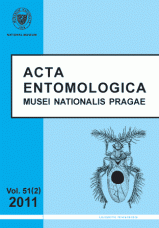Contribution to the synonymies, distributions, and bionomics of the Old World species of Macrosiagon (Coleoptera: Ripiphoridae)
Batelka Jan
Acta Entomologica Musei Nationalis Pragae 51(2): 587-626, 2011
Views: 1135
Abstract: Selected material of 26 species of Macrosiagon Hentz, 1830 from the Old World
and Australia has been studied. Based on the examination of type specimens, the
following 27 species group names are synonymised in this paper: Macrosiagon
axillaris (Gerstaecker, 1855) = M. maculaticeps Pic, 1913, syn. nov., = M.
axillare var. bedoci Pic, 1930, syn. nov., = M. subparallelum Pic, 1930, syn.
nov., = M. elongatum Pic, 1950, syn. nov., = M. axillare var. discithorax Pic,
1951, syn. nov., = M. axillare var. senegalense Pic, 1951a, syn. nov., = M.
axillare var. senegalense Pic, 1951b, syn. nov., = M. conradsi Pic, 1951, syn.
nov.; Macrosiagon bequaerti Pic, 1913, stat.nov. = M. diversipenne Pic, 1930,
syn. nov., = M. monardi Pic, 1949, syn. nov., = M. rubronotatum Pic, 1950, syn.
nov., = M. rubronotatum var. leyei Pic, 1950, syn. nov., = M. villiersi Pic,
1953, syn. nov.; Macrosiagon bifasciata (Marseul, 1877) = M. medana Pic, 1910,
syn. nov.; Macrosiagon biguttata (Blanchard, 1846) = Rhipiphorus biguttatus
Blanchard, 1853, syn. nov.; Macrosiagon bimaculata (Fabricius, 1787) =
Ripiphorus dubius Motschulsky, 1849, syn. nov.; Macrosiagon caffra (Fåhraeus,
1870) = M. caffrum var. fahraeusi Pic, 1953, syn. nov.; Macrosiagon ferruginea
(Fabricius, 1775) = Ripiphorus indicus Hope, 1831, syn. nov.; Macrosiagon
gabonica Pic, 1950 = M. senegalense Pic, 1951, syn. nov.; Macrosiagon inferna
(Schaufuss, 1872) = Rhipiphorus lugubris Fairmaire, 1887, syn. nov., =
Macrosiagon longipes Pic, 1929, syn. nov., = M. longicolle Pic, 1931, syn. nov.,
= M. longithorax Pic, 1947, syn. nov.; Macrosiagon marcelli Alluaud, 1902 = M.
lemoulti Pic, 1930, syn. nov., = M. theresae Pic, 1950, syn. nov., = M. auberti
Pic, 1951, syn. nov.; Macrosiagon signaticollis Pic, 1907 = M. signaticollis
var. usambarensis Pic, 1909, syn. nov. Macrosiagon axillaris var. bequaerti Pic,
1913 is raised to species status. The lectotype of Emenadia armata Waterhouse,
1883 is designated. Aerva javanica (Burm.f.) Juss. and Sericocomopsis sp. (S.
hildebrandtii Schinz or S. pallida (S.Moore) Schinz) (both Amaranthaceae:
Aervinae) are reported as the plants visited by adults of Macrosiagon terminata
(Laporte, 1840) and M. ferruginea in the Arabian Peninsula, Sudan and Kenya. The
plant subfamily Aervinae is recognised as playing an important role in the
bionomics of these two Macrosiagon species in the area. Nine Macrosiagon species
groups are recognised, six of them are newly established; M. bifasciata species
group is redefined and additional species have been proposed for inclusion.
Three Macrosiagon species, M. axilaris, M. caffra and M. inferna, were found to
occur both in continental Africa and Madagascar. Their possible significance for
future biogeographic studies is shortly outlined. Eight species of Macrosiagon
are identified as widely distributed Afrotropical species. The first
distributional records from the following countries or provinces are given:
Africa: Angola, Botswana, Burkina Faso, Burundi, Cameroon, Central African
Republic, Chad, Democratic Republic of the Congo, Gabon, Gambia, Guinea, Kenya,
Malawi, Mozambique, Madagascar, Namibia, Nigeria, Republic of South Africa,
Senegal, Sierra Leone, Sudan, Tanzania, Tunisia, Uganda, Zambia and Zimbabwe;
Asia: Bhutan, China (Gansu, Guizhou, Hainan Isl.), India (Darjeeling, Himachal
Pradesh, Kashmir, Karnataka, Kerala, Tamil Nadu, Uttar Pradesh), Indonesia
(Java, Kalimantan, Sulawesi, Sumatra), Iran, Laos, New Guinea, Pakistan,
Philippines, Solomon Isl., Sri Lanka, ‘Thibet’ and Vietnam; Australia:
Queensland; Europe: continental Greece.
Key words: Coleoptera, Ripiphoridae, Macrosiagon, taxonomy, new synonymy, distribution, Old World, bionomics
Papers
Acta Entomologica Musei Nationalis Pragae 2005-2011: towards higher quality and better recognition of taxonomyDermaptera of Iran with description of Euborellia angustata sp. nov.Euborellia ornata sp. nov. from Nepal (Dermaptera: Anisolabididae)A new subgenus and species of Mixotrephes (Hemiptera: Heteroptera: Helotrephidae) from Laos and notes on Mixotrephes punctatusA human case of biting by Nabis punctipennis (Hemiptera: Heteroptera: Nabidae) in ChileThe assassin bug subfamilies Centrocnemidinae and Holoptilinae in Taiwan (Hemiptera: Heteroptera: Reduviidae)A new species of Pactye from Papua New Guinea (Hemiptera: Heteroptera: Rhyparochromidae)Two new genera of the tribe Largulini (Hemiptera: Heteroptera: Largidae) from Greater AntillesA new species of the genus Eusarima (Hemiptera: Fulgoroidea: Issidae) from IranUpdating the eastern Mediterranean Deronectes (Coleoptera: Dytiscidae) with the description of two new species from TurkeyTwo new species of the Epimetopus mendeli species group and notes on its adult and larval morphology (Coleoptera: Hydrophiloidea: Epimetopidae).On the identity of Chalcionellus orcinus and Chalcionellus libanicola (Coleoptera: Histeridae)Contribution to the knowledge of Clavigeritae (Coleoptera: Staphylinidae: Pselaphinae) from Fiji and Vanuatu, with the catalogue of Clavigeritae of OceaniaBatricavus tibialis, a new genus and species of Batrisini from South China (Coleoptera: Staphylinidae: Pselaphinae)Description of seven new taxa of Cetoniinae from Indonesia (Coleoptera: Scarabaeidae)A review of the Japanese Kateretidae fauna (Coleoptera: Cucujoidea)Contribution to the synonymies, distributions, and bionomics of the Old World species of Macrosiagon (Coleoptera: Ripiphoridae)Taxonomic revision of the Oriental species of Notoxus (Coleoptera: Anthicidae)Notes on the taxonomy of Urometopus with description of a new species from northern Turkey (Coleoptera: Curculionidae)New Oriental species of Gnoristinae with pectinate antennae (Diptera: Mycetophilidae)Taxonomy of Stenomicra cogani, with description of S. gracilior sp. nov. from Turkey and comparative morphology of terminalia in Stenomicridae (Diptera)Myrmica longisculpta, a new species from Himalaya (Hymenoptera: Formicidae: Myrmicinae)Abstracts of the Immature Beetles Meeting 2011, September 29–30, Prague, Czech Republic 